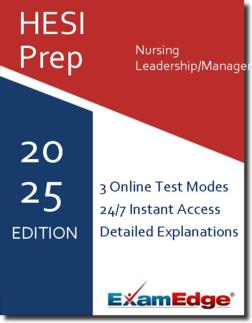HESI Nursing Leadership / Management Practice Tests & Test Prep by Exam Edge - Test Reviews
Based on 20 Reviews
- Real Exam Simulation: Timed questions and matching content build comfort for your HESI Nursing Leadership / Management test day.
- Instant, 24/7 Access: Web-based HESI Nursing Leadership / Management practice exams with no software needed.
- Clear Explanations: Step-by-step answers and explanations for your HESI exam to strengthen understanding.
- Boosted Confidence: Reduces anxiety and improves test-taking skills to ace your HESI Nursing Leadership / Management .

HESI Nursing Leadership / Management Practice Tests & Test Prep by Exam Edge - Review
HESI Nursing Leadership / Management - Reviews
Excellent
Based on
100
reviews
“ I just took my Hesi exit PN today and got a Hesi score of 1205 and a conversion score of 99.99%. Thanks for the help. Doing all those tests helped so much. Not because I saw the same questions but because I learned so much from the answer reasoning section. Hope to fly through my boards in a couple ...
Read More
Sharon, Texas
“ I recently had to test out of my school with an 850 on the Hesi PN, so I purchased the exams from you guys, about 5 to 7 exams, and passed the exit HesiPn with a 988! First time around! Then I purchased the NclexPN exam tests from you guys and I passed my nclex the first time around! These tests rea ...
Read More
Welsh, NC
“ I want to thank you. The tests are really helpful. I took them three times and after using your exams, I finally passed. The tests helped me especially in the math section, in which I got a 90.
DIANA , Texas
“ I can't believe this website doesn't have a high following status. I bought 40 practice questions, and I did 20 practice questions and took my Hesi exit. I scored 1070. I completed all 40 practice exams and passed my boards for the first time. Exam Edge introduced me to a bunch of topics and boosted ...
Read More
Juliet M., Tarpon Springs, Florida
See why our users from 154 countries love us for their exam prep! Including 20 reviews for the HESI Nursing Leadership / Management exam.
Exam Edge is an Industry Leader in Online Test Prep. We work with our Institutional Partners to offer a wide array of practice tests that will help you prepare for your big exam. No Matter how niche field of interest might be, were here to help you prepare for your test day.
| 2.8M | 4.5M | |
| Users | Tests Taken | |
| 100K | 19 | |
| Unique Exams | Years in Business | |


